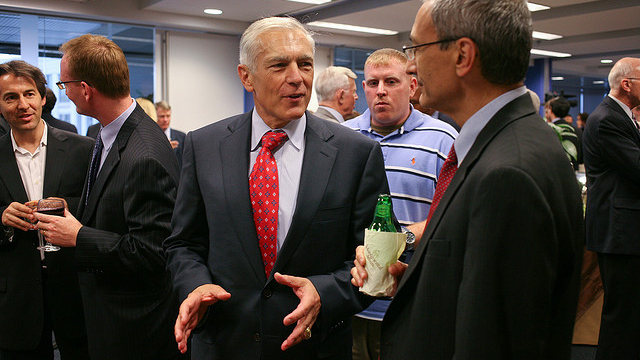Politics & Current Affairs
All Stories
Gen. Wesley Clark’s Four-Star Advice on Life, War, Foreign Affairs and America’s Energy Independence
Who better to comment on President Obama’s recent decision to declare an end to the United States’ prolonged conflict in Iraq than General Wesley Clark? In his Big Think interview, […]
“Rahm Emanuel’s expected departure is more than just your standard White House shakeup: it costs Obama the man with the political grit and muscle to make his dreams come true.”
“My sense is that the mama-grizzly phenomenon is part of populist conservatism’s obsession with American authenticity.” The Economist on why mama-grizzly has nothing to do with policy.
“The utter lack of a sense of solidarity among so many people—horrifyingly evident in the U.S. health-care debate—is now undermining the very basis of what a modern democratic society is.”
“As an antiterror measure, the U.S. government has deployed mobile X-ray technology to randomly scan cars and trucks. But the measure is riling privacy proponents.”
As the world grows more interconnected, support for developing countries should be an even bigger concern, says former Irish President Mary Robinson. A failed state like Somalia, which lacks any […]
“For decades, it has been obvious that development aid as a rule achieves exactly the opposite of that which is desired.” Spiegel on the Millennium Development Goals.
“Extreme inequality in the U.S. is the result of tax-cutting ideology, which showers largesse on the GOP’s deepest-pocketed supporters.” Yale and Berkeley political science professors weigh in.
“There’s no true power struggle within the Republican Party over ‘tea party’ candidates.” Conservative columnist Jonah Goldberg debunks the media narrative du jour.
“Are Georgia, Alabama and Florida fighting over water or over growth?” The Economist explains that population growth has put pressure on regional water resources.
“The notion that without the $700bn bailout we would be reduced to bartering was a ruse by the banks to get taxpayers’ money.” Dean Baker says we were taken in by fat cats.
“Yemen faces a potential national security crisis if its water resources continue to dry up, however solutions do exist.” A Harvard professor of Arab studies explains.
“U.S. Energy Secretary Chu encourages the peaceful use of nuclear power at this year’s International Atomic Energy Agency gathering in Vienna.”
“Troops, money and a plan were long lacking in the battle against the Taliban in Afghanistan. In a SPIEGEL interview, Commander David Petraeus, discusses these failures with unusual frankness.”
“Comedians Jon Stewart and Stephen Colbert inspired to hold rally for sanity in Washington DC after Reddit online campaign.” The Guardian reveals the source of the comedians’ fountain.
“The Obama administration has been tardy to tackle economic misery, but looks set to lose to a GOP that would do even less.” Who will tackle America’s poverty problem?
MIT historian John Dower examines the history of American militarism through its justifications for military expenditure, namely that other cultures lack the capacity for Western logic.
“America is in the worst spasm of bigotry and paranoia since the McCarthy era. But the irony is that persecuting Muslims at home actually endangers American security abroad.”
“Under our current system of campaign finance, there is a fundamental gap between the interests of voters and of contributors.” Harvard’s Lawrence Lessig on the Congress’ institutional corruption.
“Sept. 11 used to be a day when America came together—party politics took a backseat to reconciliation. The anniversary of the terrorist attacks this year threatens to become a day of hate.”
“Nine years later, it’s so easy to get people to go crazy. If I wanted to, I could probably start another India-Pakistan war all by myself.” The New Yorker’s George Packer on the loss of reason.
“President Obama and his administration have embraced the secrecy and usurpations of power that made possible the Bush-Cheney betrayal of American values.”
“Did 9/11 make us all mad? Our memorial to the innocents who died nine years ago has been a holocaust of fire and blood.” The Independent’s Robert Fisk laments the ongoing wars.
“Barack Obama’s expected advantages are turning into handicaps in the war on terrorism.” The Economist says the softer, kinder President has failed to distinguish his own approach.
“When confronting threats real or imagined, Americans tend to go big, very big.” A former Middle East CIA specialist says the political response to terrorism is often too cumbersome.
“Obama is a clear and knowing accessory to war crimes, and should at some point face prosecution.” The Atlantic’s Andrew Sullivan on Obama’s use of executive privilege.
“Free exercise of religion? No, thanks. The taming and domestication of religious faith is one of the unceasing chores of civilization.” Christopher Hitchens on the freedom to practice faith.
“There are nine states in the union where the government maintains a direct monopoly on the sale of hard liquor.” The Economist reports on these ‘lonely outposts of American socialism’.
Politics and economics used to divide Europe into parts East and West, but now North and South better define the continent’s different approaches when it comes to managing money.
“Incarceration in America is a failure by almost any measure. But what if the prisons could be turned inside out, with convicts released into society under constant electronic surveillance?”

